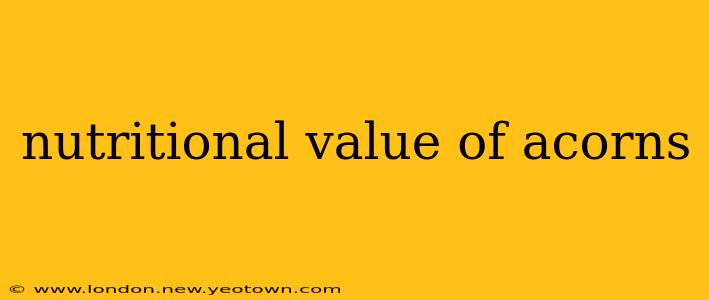Acorns, those humble nuts nestled within the cups of oak trees, have long held a place in human history, serving as both a crucial food source and a symbol of strength and longevity. But beyond their cultural significance lies a fascinating nutritional profile, packed with benefits that are only now being fully appreciated. This isn't just about squirrels and deer anymore; acorns are making a comeback as a viable, and surprisingly nutritious, food source.
Let's delve into the world of acorn nutrition, uncovering the secrets hidden within these seemingly simple nuts.
What is the Nutritional Content of Acorns?
The nutritional value of acorns varies depending on the species of oak tree and the environmental conditions where they grew. However, generally speaking, acorns are a good source of:
- Carbohydrates: Acorns provide a decent amount of carbohydrates, primarily in the form of starch. This makes them a potential source of energy.
- Fiber: Acorns are relatively high in fiber, contributing to digestive health and promoting satiety.
- Healthy Fats: They contain monounsaturated and polyunsaturated fats, which are considered beneficial for heart health.
- Protein: While not as high in protein as some other nuts, acorns still offer a significant amount, contributing to overall nutritional intake.
- Minerals: Acorns are a good source of various minerals, including potassium, calcium, magnesium, and iron, all essential for bodily functions.
- Vitamins: They contain small amounts of several vitamins, although not in high concentrations.
It's important to note that the nutritional composition can change based on factors like the acorn's maturity and the processing method used.
Are Acorns Nutritious? A Deeper Dive
Yes, acorns are indeed nutritious! But the key lies in proper preparation. Raw acorns contain high levels of tannins, bitter compounds that can cause digestive upset and interfere with nutrient absorption. The tannin content is the primary reason why thorough processing is crucial before consumption.
How Do You Prepare Acorns for Eating?
The traditional method of preparing acorns for consumption involves leaching – a process of soaking and repeatedly changing the water to remove the tannins. This can be time-consuming, but crucial for removing the bitterness and making the acorns palatable. Modern methods might include using a food processor to make acorn flour, which is then used in baking or cooking.
What are the Benefits of Eating Acorns?
Beyond their nutritional content, consuming acorns (after proper preparation) offers several potential benefits:
- Improved Digestive Health: The fiber content promotes healthy digestion.
- Sustained Energy: The carbohydrates provide a slow-release energy source.
- Heart Health Support: The healthy fats may contribute to cardiovascular health.
- Increased Mineral Intake: Acorns offer a range of essential minerals.
Are Acorns Good for Weight Loss?
While acorns offer some nutrients and fiber, contributing to feelings of fullness, they are not a miracle weight-loss food. A balanced diet and regular exercise are still crucial for successful weight management.
Can You Eat Acorns Raw?
While technically you can eat raw acorns, it's strongly discouraged. The high tannin content can cause digestive issues, and the bitter taste is generally unpleasant. Always leach or process acorns before consumption.
Are Acorns Safe to Eat?
Acorns are safe to eat after proper preparation to remove tannins. Eating raw acorns can cause digestive problems. Furthermore, it's essential to correctly identify the type of acorn before consumption, as some species are more toxic than others. When in doubt, consult an expert before consuming wild acorns.
Conclusion: Acorns – A Nutritional Powerhouse Waiting to Be Discovered
Acorns, once a staple food for many cultures, offer a wealth of nutritional benefits. From their rich mineral content to their fiber and healthy fats, they deserve a prominent place in a balanced diet. While preparation is crucial, the rewarding taste and nutritional value of properly prepared acorns make them a worthy addition to your culinary repertoire. Remember to prioritize proper preparation and identification to ensure a safe and enjoyable culinary experience.

